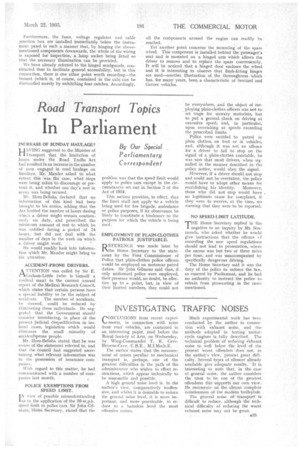Road Transport Topics
Page 49

If you've noticed an error in this article please click here to report it so we can fix it.
In Parliament
INCREASE OF SUNDAY HAULAGE?
HAVING suggested to the Minister of Transport that the limitation of hours under, the Road Traffic Act had resulted in an increase in the number of men engaged in road haulage on Sundays, Mr.: Mander asked to what extent this was the case, what steps were being taken to discourage or prevent it, and whether one day's rest in seven was being secured.
Mr. Hore-Belisha declared that no information of this kind had been brought to his notice, adding that the Act limited the number of hours during which a driver might remain continuously on duty, and prescribed the minimum amount of rest to which he was entitled during a period of 24 hours, but did not deal with the. number of days in the week on which a driver might work.
He would readily look into information which Mr. Mander might bring to his attention.
ACCIDENT-PRONE DRIVERS.
ATTENTION was called by Sir E. Graham-Little who is himself a medical man) to the current annual report of the Medical Research Council, which states that certain persons have aspecial liability to be the subject of accidents. The number of accidents, he showed, could be reduced by eliminating these individuals. He suggested that the Government should consider introducing, in place of the present Judicial disqualification in isolated cases, legislation which would eliminate the small minority of accident.prone people.
Mr. Hare-Belisha stated that he was aware of the statement referred to, and that the council had suggested a.scertaining what relevant information was in the possession of insurance companies.
With regard to this matter, he had communicated with a number of companies last month.
POLICE EXEMPTIONS FROM SPEED LIMIT.
IN view of possible misunderstanding ds to the application of the 30--m.p.h. speed limit to police cars, Sir John Gilmour, Hanle Secretary, stated that the
position was that the speed limit would apply to police cars except in the circumstances set out in Section 3 of the Act of 1934.
This section provides, in effect, that the limit shall not apply to a vehicle being used for fire brigade, ambulance or police purposes, if its observance be likely to constitute a hindrance to the purpose for which the vehicle is being used.
EMPLOYMENT OF PLAIN-CLOTHES PATROLS JUSTIFIABLE.
REFERENCE was made later by 1.‘the Home Secretary to the statement by the First Commissioner of Police that plain-clothes police officers would be employed on motorcar patrol duties. Sir John Gilmour said that, if only uniformed police were employed, their presence would, no doubt, be effective up to a point, but, in view of their limited numbers, they could not be everywhere, and the object of em.ploying plain-clothes officers was not to set traps for unwary motorists, but to put a general check on driving at excessive speed, and, in particular, upon overtaking at speeds exceeding the prescribed limits.
Police were entitled to patrol in plain clothes, on foot or in vehicles, and, although it was not an offence for a driver to fall to stop on the signal of a plain-clothes constable, he was sure that most drivers, when signalled in the manner described in the police notice, would obey thesignal.
However, if a driver Should not stop and could not be overtaken, the police would have to adopt other means for establishing his identity. Moreover, those who did not stop would have no legitimate cause for complaint, if they were to receive, at the time, no warning that they were to be reported.
NO SPEED-LIMIT LATITUDE.
THE Home Secretary replied in the negative to an inquiry by Mr. Sim-. monds, who asked whether he would give instructions that the offence et exceeding the new speed regulations should not lead to prosecution, where the excess was but two or three miles per hour, and was unaccompanied by specifically dangerous driving.
The Home Secretary said it was the duty of the police to enforce the law, as enacted by Parliament, and he had no authority to instruct the police to refrain from prosecuting in the case; mentioned.




























































































